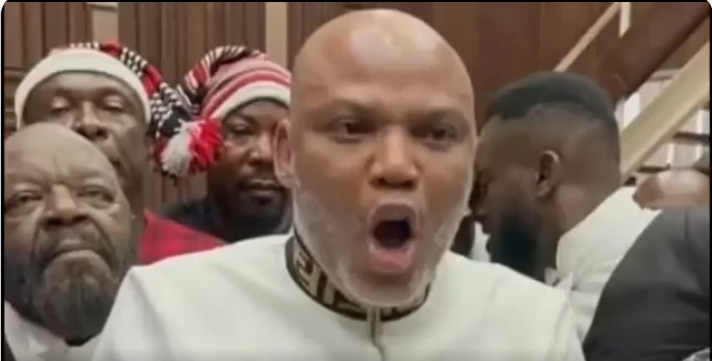
Nnamdi Kanu Defends Self in Court as Lawyers Withdraw Their Representation.
Abuja, Nigeria – October 23, 2025
The unlawful trial of the illegally detained leader of the Indigenous People of Biafra (IPOB), Mazi Nnamdi Kanu, took a dramatic turn on Thursday at the Federal High Court, Abuja, as Kanu announced his decision to represent himself following the withdrawal of his entire legal team.
According to court proceedings, lead counsel, Chief Kanu Agabi (SAN), informed the bench that he and other Senior Advocates of Nigeria on the defence team had applied to withdraw. In an interview with the media when questioned about their withdrawal from the case, he said that Kanu “has decided to conduct his defence by himself,” adding that Kanu “has the right to do so, we respect that decision, and we wish him well going forward.”
When Mazi Nnamdi Kanu was asked by the trial judge whether new counsel should be assigned to represent him, he declined, insisting he would personally conduct his defence.
This development places Kanu in full control of his defence strategy, a rare move in Nigeria’s legal history, despite widespread concerns over the legality of his trial. The withdrawal of his lawyers and the dramatic naming of top political and military figures as witnesses have set the stage for a highly contentious next phase.
On Wednesday, Kanu submitted to the court a list of 23 witnesses, naming high-profile figures such as former Attorney-General Abubakar Malami, Governors Nyesom Wike and Babajide Sanwo-Olu, former Chief of Defence Staff Lucky Irabor, and former Chief of Army Staff Tukur Buratai. Peoples Chronicles
Abduction, Rendition, and Ongoing Detention
Mazi Nnamdi Kanu, who was extraordinarily renditioned from Kenya by the Nigerian government in June 2021, remains in detention at the Department of State Services (DSS) facility in Abuja.
His abduction and unlawful rendition have drawn international condemnation, with both local and international courts ordering his release. The United Nations Working Group on Arbitrary Detention has, since 2022, demanded his immediate and unconditional release, describing his continued detention as a violation of international law.
Critics argue that Kanu’s prolonged incarceration and prosecution amount to political persecution, citing the government’s blatant refusal to obey multiple court rulings, including the 2022 Court of Appeal judgment which discharged and acquitted him of all charges. Despite that ruling, the Nigerian government has continued to hold him in defiance of judicial orders.
Controversy Over NMA’s Role in Declaring Kanu Fit for Trial
Fresh concerns have emerged over the role of the Nigerian Medical Association (NMA) panel that recently declared Kanu fit to stand trial. A member of the association publicly questioned the legality of the panel’s involvement, arguing that the NMA “has no powers to declare Nnamdi Kanu fit or unfit to stand trial.” Peoples Chronicles
Defence counsel Barr. Aloy Ejimakor described the NMA’s report as “an ambush”, stating that the association acted contrary to a standing court order and based its findings on an informal meeting rather than a formal medical examination. He argued that the report’s submission without prior notice undermines due process and casts serious doubt on its credibility, a point expected to form part of Kanu’s legal challenge.
Protest Crackdown and Renewed Arrests
In a related development, tension heightened in Abuja on October 20 during a #FreeNnamdiKanuNow protest when police reportedly arrested Kanu’s younger brother, Prince Emmanuel Kanu, and his lawyer, Aloy Ejimakor, alongside several protesters. Witnesses say police used live ammunition and teargas to disperse peaceful demonstrators demanding Kanu’s release. Peoples Chronicles
Three days later, Emmanuel Kanu, Ejimakor, and eleven others remain in detention. The arrests have revived memories of the October 20, 2020 #EndSARS protests, during which over 100 Nigerian youths calling for an end to police brutality were reportedly massacred, and many more disappeared.
Kanu’s decision to self-represent, coupled with the intensifying crackdown on his supporters, underscores the deepening political and human rights tensions surrounding his case. As the trial continues, all eyes remain on the Federal High Court and the Nigerian government’s next steps — amid growing calls for justice, due process, and adherence to international law.